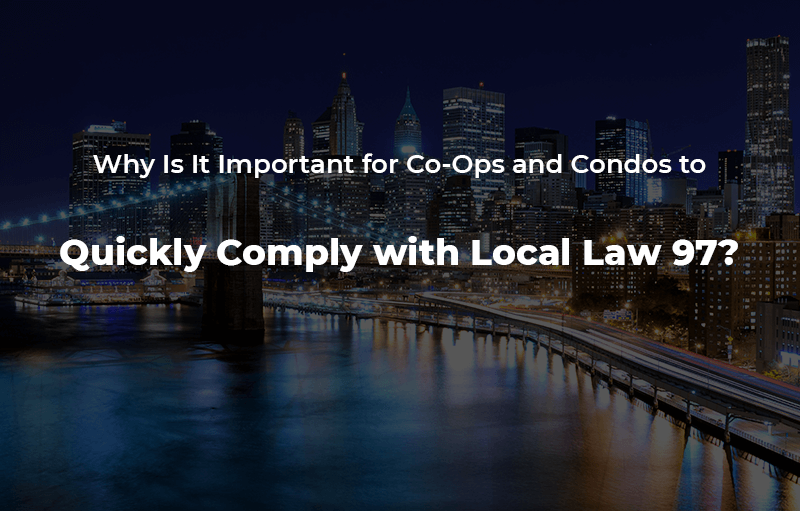
11 Aug Why Is It Important for Co-Ops and Condos to Quickly Comply with Local Law 97?
Time Is Running Out for Co-ops and Condos to Comply with Local Law 97
Co-op and condo owners need to take Local Law 97 compliance seriously. Ignoring LL97 requirements for a long time will contribute to severe financial repercussions. Therefore, investing in energy projects as per the requirements of LL97 at the last minute will prove to be costly for co-op condo owners. Dive into this article to understand why immediate Local Law 97 compliance is essential for condos and co-ops.
How Will Late Compliance Culminate into Higher Fines?
By 2024, all buildings over 25,000 sq ft, including multifamily housing societies, co-ops, and condominiums, will have to lower their carbon emissions as per the legal standards. Otherwise, they will have to pay fines to the authorities. In the current landscape, around 80% of buildings are in compliance with carbon emission requirements.
But the prescribed caps under Local Law 97 will become even more stringent by 2030 and in upcoming years. As a result, only 15% of buildings are likely to be in compliance with the 2030 targets. Therefore, co-ops and condo owners should look forward to meeting the more stringent standards of 2030 from now to avoid paying hefty fines in the future.
Every building, poor or rich, should immediately go beyond the 2024 LL97 requirements. After that, buildings should focus on meeting 2030 and 2304 goals. It will eventually help all buildings reach the ultimate goal of total electrification.
Building owners shouldn’t panic because the authorities are giving them a lot of time. However, the time has come to start thinking about what to do in the interim steps. So building boards should get busy with local law 97 compliance instead of seeing it as a requirement for the distant future.
Property management firms are giving different types of advice to building owners, from applying for grants to opting for loans.
Essential Measures for Building Owners to Reduce Carbon Emissions
Every building owner needs to have an effective strategy for lowering carbon emission for the near, medium, and long-term future to comply with LL97. The right steps to reducing carbon emissions are as follows:
- Hiring professionals with expertise in LL97 compliance
- Performing energy audits
- Maintaining HVAC systems
- Identifying areas of energy waste
- Performing accurate energy star benchmarking
- Using recycled content
- Using energy-efficient light systems
- Controlling water usage
Closing Thoughts
NYC Local Law 97 compliance is necessary for buildings to reduce their GHG emissions. If you are struggling with complying with the requirements, the experts at The Cotocon Group can help. We have years of experience in helping building owners design cost-effective strategies for reducing their carbon footprint.
Choose us to reach the ultimate goal of eliminating greenhouse gas emissions by 80% by 2050. Additionally, our compliance experts will ensure you enjoy lower utility bills and better property values.
FAQs:
- Who should follow Local Law 97 requirements?
Every NYC building over 25,000 sq feet needs to follow local law 97 requirements. Each period’s annual carbon intensity limit varies according to the building type.
- What is the link between LL97 and LL87?
LL87 helps in creating a roadmap for complying with LL97. The best retro-commissioning measures after an energy audit automatically lead to low-cost carbon solutions.
- What is the fine for LL97 compliance?
Building owners need to pay a fine of $268 per metric ton for the exceeded greenhouse gas emission limit. Fines are also applicable when you submit false reports or don’t submit any reports.
- When will building owners have to submit LL97 compliance reports?
After LL97 comes into effect in 2024, building owners will have to submit their first report in 2025. The report should contain detailed information about the building’s carbon emissions in 2024.
- Which buildings are exempt from LL97 requirements?
Industrial buildings producing electrical power or steam don’t have to comply with LL97. Moreover, detached or semi-detached buildings of three stories or less are exempt if each owner maintains their own hot water and HVAC systems covering less than 25,000 sq ft.
- What are the benefits of local law 97 compliance?
Complying with LL97 will prevent building owners from paying hefty fines. Additionally, building owners will enjoy lower energy costs and enhanced property values.
